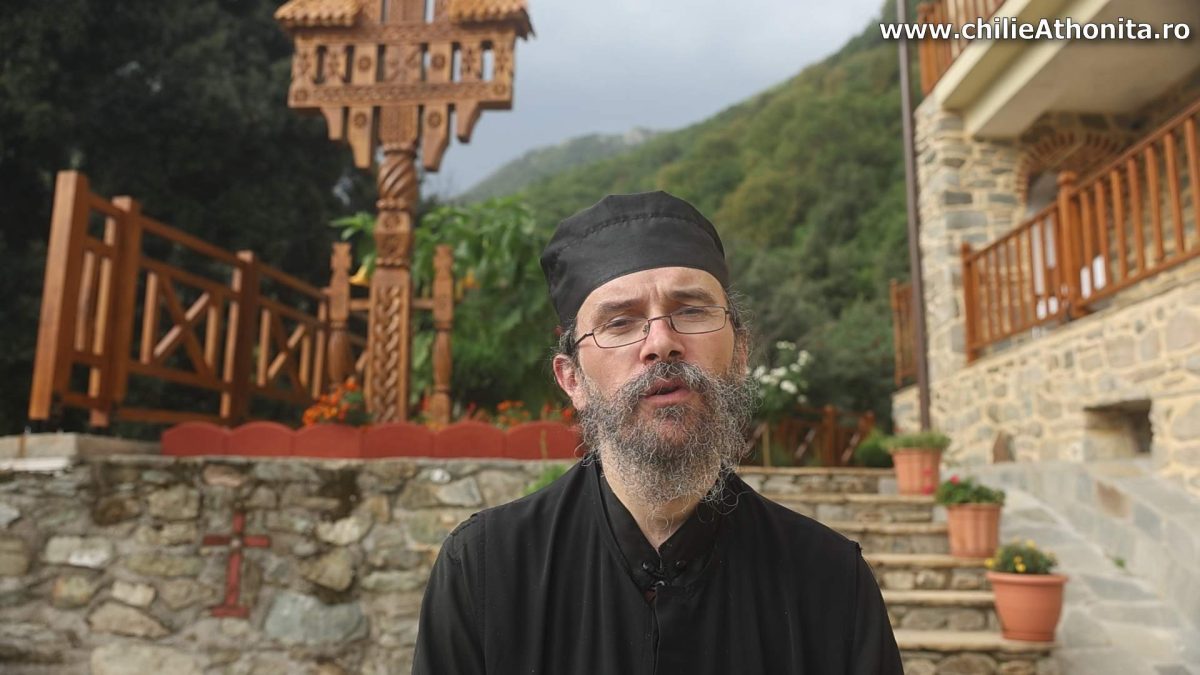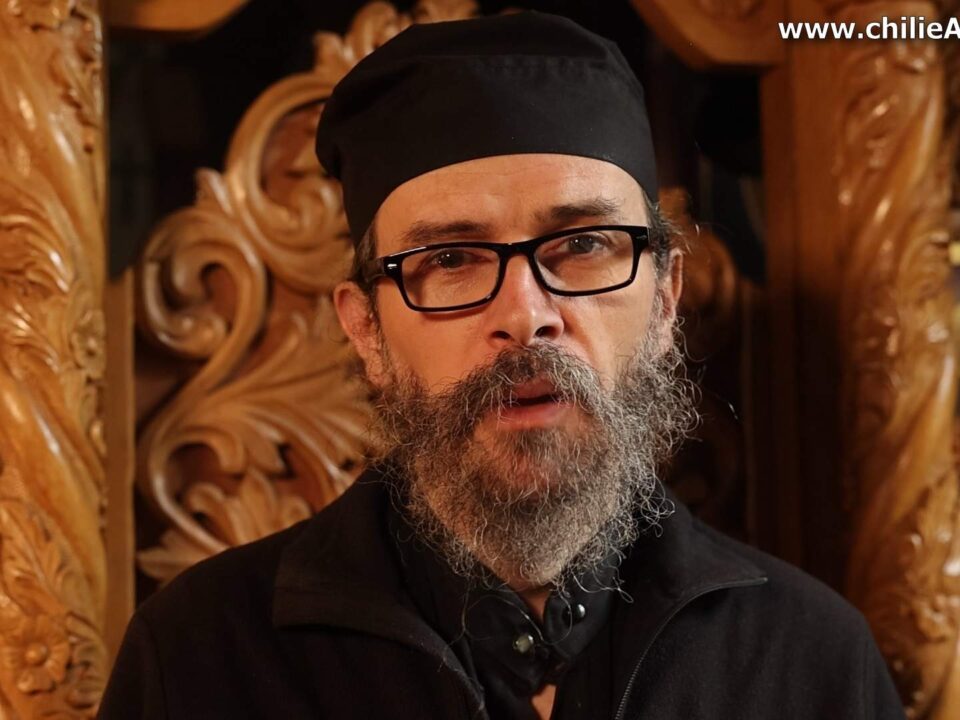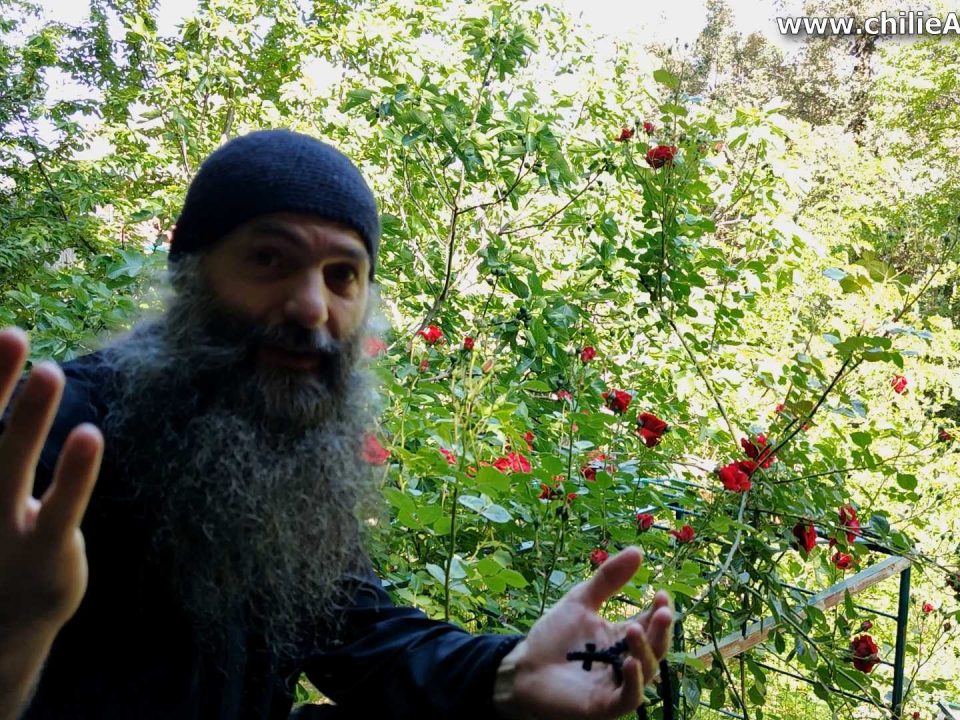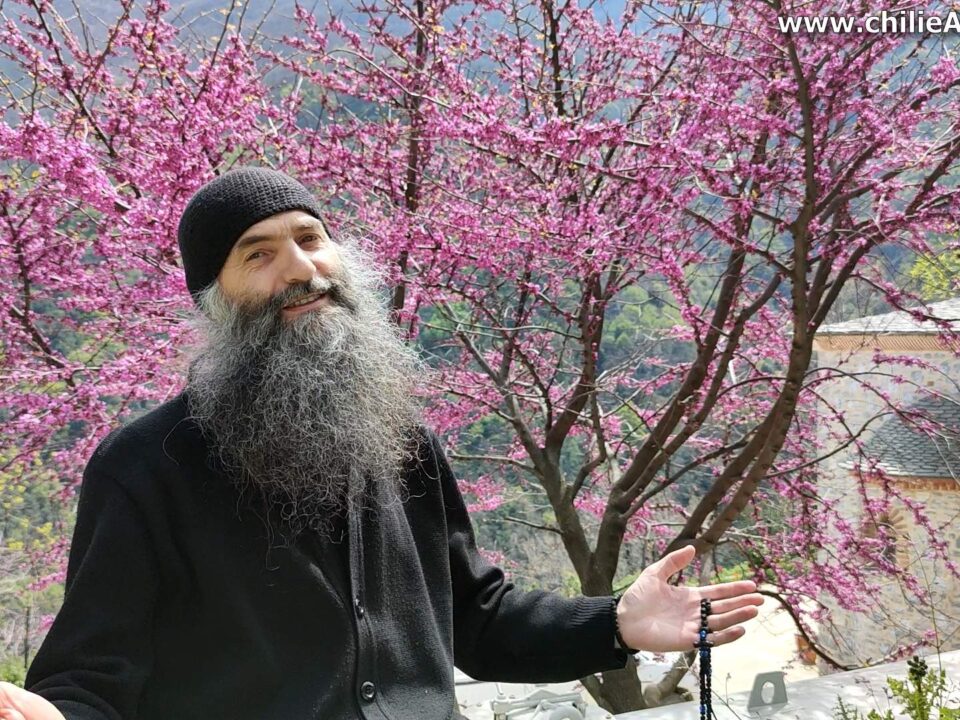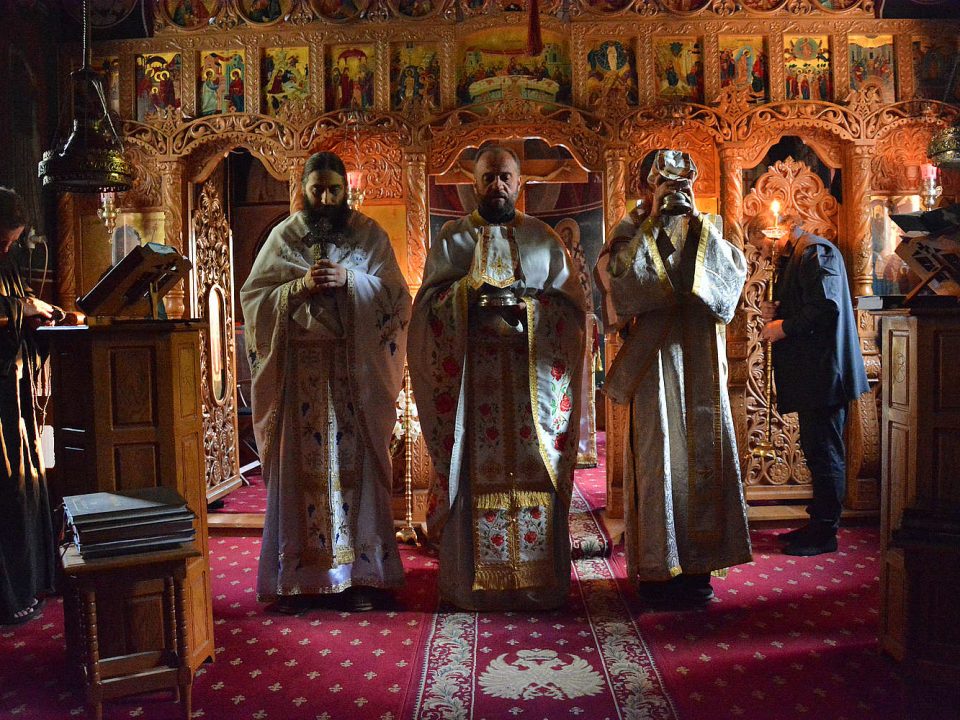It is frightening that people far from God struggle much more than those close to God without the expected results and without wanting to get closer to God.
You will find an analysis of this phenomenon and related ones in the present video.
Enjoy!
Glory to the Father and to the Son and to the Holy Spirit now and forever and to the ages of ages. Amen. Through the prayers of our Holy Fathers, Lord Jesus Christ, Son of God, have mercy on us. Amen.
I am impressed these days by a fact that I notice in the non-Orthodox world – it is true that I have all the time to say “in the Western world”, but it is also about the Easterners: China, Japan, South Korea – in those parts. I am impressed by the fact that in this area of thinking there is – if we look at things from a certain angle – a much more difficult struggle than the toughest chapter of “The Ladder” – chapter 5. A much more difficult struggle, but with results – NOT much lower in the case of non-Orthodox – but with negative results; soul-destructive results. I mean, it’s a paradox, folks.
So the unorthodox world outside Orthodoxy struggles more and has not zero results, but negative results. Of course, we do not judge people, nor can we, and beyond that, we are commanded not to judge people—but we judge the spirit, the facts that exist, the phenomenon, and this in order to avoid it.
Brothers, we must inform ourselves, stay awake. That’s why I’m raising these issues. Sitting in a shell and ignoring the reality that surrounds us, leaving our young people with their problems is not a solution, you know. In fact, by leaving our young people and even ourselves in the grip of the great concrete problems we face, we are actually leaving our present and our future. I say this because some people want such a peaceful Orthodox life – and I do! – simple – and I want, yes…! – let’s talk simple, armchair spiritual things that magically give hope – brothers and I actually want this job, but … The reality, however, is different.
But let’s go back to “The Ladder”. For those who do not know, “The Ladder” is considered in the Church the 2nd book following the Holy Scripture, the main book of asceticism, spiritual life especially for Cenobitic monasteries, but not only, because we must mention that there are not two ascetics, two spiritualities – one for laymen and one for monks. Of course, there are some differences in intensity, mainly, as well as certain things related, of course, to the family, but that’s it.
There is only one spirituality for all, because human nature is the same for monks and laymen. And our Lord Jesus Christ gave only one teaching.
As I said, I am reading these days the famous chapter 5 of the “Ladder” of St. John Sinaites, of St. John of the Ladder, chapter in which the Saint describes a prison – “The Prison”. In fact, a very ascetic monastery where monks entered, who usually locked themselves there to repent of great sins they had previously committed. What we need to mention here is that these people were willingly repenting—one, because they felt in their souls that they had trampled under their feet the delicacy of God’s love, the beauty of God’s love.
It’s not because God gets angry about it or takes revenge like a tyrant, it’s not about that—it’s about a very high sense of God’s presence and His sublime love within them, that is, heaven. So man felt heaven within him in all his delicacy, and because of this man repented. And two, the deeds they repented of, brothers, seem insignificant to us. Understand? But because people had this very high life, because of this they felt the withdrawal of grace.
For example, there was one who had argued with another and called him “babbler!” and for this he asked to go to “prison” – and insisted on it even though his abbot tried to be a peacemaker at first. You must know, brothers, that the moment someone has had a very great grace and hurts grace, he knows what he has lost and does everything possible to regain it. Because of this you will see in that chapter – if God helps you to read the book and please read the book – some extreme asceticism to get grace back. It is true that most of us do not have a great sense of grace from the beginning, because this path is also the hardest to take, as St. Silouan says.
Many of us have a gradual, gradual path, little by little, yes, and we taste the great grace—if we taste it, of course—only toward the end of our lives. Know that the main criterion of differentiation here is interest, zeal. How much we care, how much we want it, how much zeal we have, the more grace comes and look for us.
The problem with those with a lot of grace at first is that they have no experience and the devil – who has much more experience – envies them very much, and if those with great zeal run at high speed and without guidance (!), by their thoughts, then they will stumble and lose grace. In that moment, support is needed, the moment grace is lost. Lots of support. They should not seek to solve their problems on their own, but go to confess to an experienced confessor, because they will have a great Cross and, of course, if they resist, a great Resurrection.
But he must not lose courage! Don’t lose heart! I’ve said it 100 times. You have no blessing to lose courage. In fact, this is true for all of us: let us not lose courage, brothers! Even for those of us who do not have these intense feelings, who had a slightly lesser grace at first, at first you must know that a period of dryness, of withdrawal of grace, is inescapable.
It is similar to the Jews’ journey to the Promised Land: in the beginning – if you have read the Old Testament, God through the spiritual leader – there he was represented by Moses – works a lot of miracles; This is the season of grace that is abundant in the beginning and in which the disciple must obey and be zealous. Be close to his spiritual leader as much as possible. Mainly listening. And not so much after his thoughts.
This period, according to St. Joseph the Hesychast, lasts about 3-4 years, after which grace withdraws. It doesn’t leave, because if it leaves because of our general negligence, our gross way of behaving, or because of a serious mistake, then it’s serious, yes, and we get to the “prison” I mentioned before, the dry period of grace, or, in other words, if we are to continue our analogy with the Jews’ road to the Promised Land, it is about that period of dryness that is symbolized by the passage through the Arabian Desert, that is, through the desert of gracelessness, in which also appear the thirst for it, the sight of the inner hell and, paradoxically, but expectedly, the murmurs against the spiritual leader who can lead us out of this desert. Understand?
Of course, at the end is the entrance into the Promised Land, that is, the deifying enlightenment of grace – this is for those who do not die in the desert through the sin of despair or return to Egypt, that is, to the land of worldly pleasures. Well, and here are the problems. That is, remembering or even experiencing pleasures the moment grace withdraws. At that moment we need asceticism, we need striving as a source of pain to cut off the sensation of pleasure that comes to us from the sin we have experienced from the past or even that we are experiencing now. Because of this, those knowledgeable fathers wanted to go to “prison” and had spiritual experiences there – even though their asceticism is almost unbelievable to us. Understand?
It is a phenomenon similar to that of Romanian saints in prisons, but the latter did not enter willingly and did not torment themselves. It is true that the torments of the Romanian saints in prisons were probably much greater than those of the fathers who struggled in the prison mentioned by Saint John.
Regarding this parallel with our day, I said at the beginning of my speech that I am impressed by a phenomenon that exists in the unorthodox world, in the scientifically and technologically developed world as a result of the relative peace, balance and enlightenment of mind brought by Christianity – even if this world uses these gifts rather to its destruction.
You see, Christianity brought the idea of love, cooperation, progress together in a stable, peaceful setting – which changed the face of the world. It is true that because of our passions we still go to war, we still distort these ideals, but the influence of Christianity is undoubted, brothers, and propels society to a totally higher plane.
Well, so where’s the problem? The main problem is the presence of passions, brothers, as I said, their struggle to distort man, to distort us from the spiritual path we are on; If those in St. John’s “prison” were full of hope under the wave of slight despair from the sight of their sin, from the sight of inner hell, our civilization in which we live is full of despair, of depression. We are depressed as a civilization. This difference stems from openness to God. So those people who were in prison were open to God. And second, who is the god everyone worships?
That’s because the god of today’s civilization is generally money, matter, fame, bodily pleasures. They are all dead, cold, incapable of love and fulfilling the human personality. People today are in a great prison, brothers, we are prisoners, slaves willingly – without even knowing it, only so some of us suspect – prisoners of the cruelest tyranny: the tyranny of their passions, induced, of course, by those who rule who, in turn, are slaves to the passions.
Do not envy them, brothers! We are all slaves to passions and we are all in the prison of our passions in which we blind. And brothers, all of us humans are guilty of this. Not others. It’s not the others. We are all guilty. Understand? We make great efforts, asceticism perhaps even greater than those in “The Ladder” and the result is the destruction of the soul and nervous system. Understand?
The moment we open ourselves to the personal, loving, and all-powerful God, in that moment we have hope, brothers. We have the hope of love, of salvation, of a happy eternity, of interpersonal communion. We can enjoy people, we can enjoy the love of others.
We need to know that if we try to short-circuit this relationship and have direct contact with others without God, the result will still be loneliness, all depression. Paradoxical, but that’s right. Of course, it is absolutely necessary to communicate with others in order not to set in depression faster, but what is really missing in a relationship is God. Why? Because God is the source of true existence, of true life, beyond the biological, factual existence that even a stone can have. Understand?
You see, God being the source of existence, He is at the center of creation as in the center of a circle, and existences are on the circumference of this circle and are connected to God as by existential rays. The further they depart from God, the further they depart from plenary existence, the less they exist. The closer he gets to God on the rays of this circle, the more he lives, the more fully he exists. But imagine for a moment: if two existences approach God on their existential rays—on this circle in which God is at the center—the closer the two existences come together. So two existences, two people, come to truly meet only in God.
Let us look for no other way, brothers, as there is none. Only the love of the Cross, of sacrifice, of openness to others through God is the key that gathers and unites the shards of humanity. Understand? Of the global Adam.
Brothers, God is not an unplugged old man with a triangle on his head and a ball in his hand with chubby angels buzzing around him. God is existence above all existence, He is Self-existence, He is omniscience above all science, He is omnipotence above all power, He is love above all love. It is perfect interpersonal communion.
Because God is purely spiritual, immaterial—the furthest thing from God that He has thus created is matter; stone, money, wealth—this is not evil in itself, that God created it, but is evil in its force of attraction away from God. So the problem is with us – it’s a pole of attraction. It’s not the problem in the matter itself. Understand?
As you probably know, the devil was created closest to God, but he came farthest—not by creation—but by his will. So we have to be careful about our will. The devil is the greatest drama in the space-time continuum and, we could say, beyond. Understand?
Well, a crucial point in our dematerialization, our distance from matter, and here the main event is death, because through this we lose our body, our indissoluble connection with matter, and through this we also lose our consciousness, the knowledge of our limitations, of our fall. And so if until death we do not change in a loving direction, of union with God and with others, then we will be eternally frozen in our solitude, far from the center of existence, that is, from God. Remember that idea of the circle, the image of the circle, which is not mine, is of St. Dionysius the Areopagite, in the first century.
This is why we must always think about death, always think about how to become better, how to love more, but not with depression, but with hope, with much hope and with the desire to unite with God and with others, beyond their sins. Yes, ok, the others have sins. We all have, brothers—we all do. This, of course, does not mean that we should validate sins, but we should be understanding with others and not separate from them in our hearts.
Those in the prison of St. John the Ladder had this hope, this consolation, while we, today, in the prison of this world, are on the heights of despair – to quote Cioran – brothers, do not read Cioran, be careful, because you will go from depressive to more depressed. And we are on the verge of despair, why? Because we lack this consolation of the hope of communion with a loving God and with all men, with all the members of the global Adam.
Beyond that, the thought of death in God’s Spirit that I mentioned is an essential catalyst for improving our behavior toward God and others. Brothers, what we do unto death we do! We cannot afford to whimper. This thought is essential on all levels of human life, brothers, including in business.
All the holy fathers urged us to think about death, you know, everyone. You can read wherever you want. I’ll give you just a few examples. For example, a very great Saint – famous in Cyprus – Saint Neophyte the Recluse said that man’s greatest wealth is the fear of God and the memory of death. Saint Porphyrios said that we should live as people who die tomorrow and work as people who never die again. Understand?
The thought of death is very present throughout Orthodox ascetics. But only in Orthodox ascetics? Let me tell you a case… I’ve told you before, I think, but it doesn’t matter that I’m repeating myself because we need to learn the great value of death consciousness as a passage beyond and not in a depressive sense, a value that even businessmen have realized, as I said.
There were two young men who had a computer company, brothers and the company was doing well, it was starting to grow… One of them was technically very good, the other was very good managerially. At one point, the company’s management fired the… Well, a whole very sad story… They fired the managerial one.
In a certain time, not very long the company comes to the brink of bankruptcy and in desperation they call back the one who was very good from a managerial point of view. When I say on the verge of bankruptcy brothers, I mean with proper paperwork, with documents, not a joke. And here comes the one who was very good from a managerial point of view and based on one question manages to make this company the first trillion-dollar company in the world. I don’t know if you know who it is – it’s Steve Jobs and Apple.
What was the question? Steve Jobs in the morning when he went to wash, to prepare himself in the bathroom, looked in the mirror and wondered and said: “If by night I die, I go, what am I going to change in the company? What am I going to change today? What am I going to change in my life?” Understand? And based on that one question, Jobs made Apple the world’s first trillion-dollar company.
Brothers, the thought of death is essential, and you must know that before, philosophy was the science that dealt with the study of death. That’s philosophy, the love of wisdom—the study of death. Over time, after ancient Greece, it developed in all branches that we know today. Understand? This is very important: always think about death and always die with a loving heart – this is the right death.
You must know, brothers, that God is not interested in what we do. He is interested in the amount of love we put in. God created this whole universe, He is not interested in our work, and so on. He is interested in how much love we put into the work we do. All other people expect heaven from us, they expect love. And we must give love – of course, each on his own plan, including professionally. The products we offer must be a proof of our love, an expression of our love. Understand?
We note again here that to love the other is to listen to him—obedience that is not perfectly equal to doing all his will unconditionally. I say this because today people are very disoriented. We are confused because the moment God disappears the Truth and so everything is just story and power.
Everyone has their stories they believe or don’t believe, their power they want to impose, and their truth. In fact, we make ourselves gods and then we say that the truth is us, that they are all stories and it’s a matter of power, it’s not a question of truth.
Nota bene, brothers, know that even an AI can say that it is the truth, because it is made according to our way of thinking. Yes, but it is quite different when a program believes itself to be god, a program that manages critical sectors of society. Think about it!
So, brothers, in order to get out of the prison of this world, asceticism is needed, which we do anyway, brothers, but we also need a correct vision of reality, that is, a correct faith in God, a correct connection with Him, with others, and this is done as I said through asceticism, sacrifice and labor, but in the name of God for Him and for people, for people and not for wealth, for money.
So the moment we think right, everything is resolved. Because brothers, in order to get out of prison, we must have the right thought, the good thought, and then we will know how to get out. But if we have the right mind, the connection with God, you will see that it doesn’t even matter where we are. Getting out of prison suddenly became secondary, because we united with Self-Freedom, with the Almighty and loving God.
In this way may the good God help us!
Through the prayers of our Holy Fathers, Lord Jesus Christ, Son of God, have mercy on us. Amen
Pomelnice online și donații
Doamne ajută!
Dacă aveți un card și doriți să trimiteți pomelnice online și donații folosind cardul dumneavoastră, sau/și să susțineți activitatea noastră filantropică, inclusiv acest site, vă rugăm să introduceți datele necesare mai jos pentru a face o mică donație. Forma este sigură – procesatorul de carduri este Stripe – leader mondial în acest domeniu. Nu colectăm datele dvs. personale.
Dacă nu aveți card sau nu doriți să-l folosiți, accesați Pagina de donații și Pomelnice online .
Ne rugăm pentru cei dragi ai dumneavoastră! (vă rugăm nu introduceți detalii neesențiale precum dorințe, grade de rudenie, introduceri etc. Treceți DOAR numele!)
Mai ales pentru pomelnicele recurente, vă rugăm să păstrați pomelnicele sub 20 de nume. Dacă puneți un membru al familiei, noi adăugăm „și familiile lor”.
Dumnezeu să vă răsplătească dragostea!


